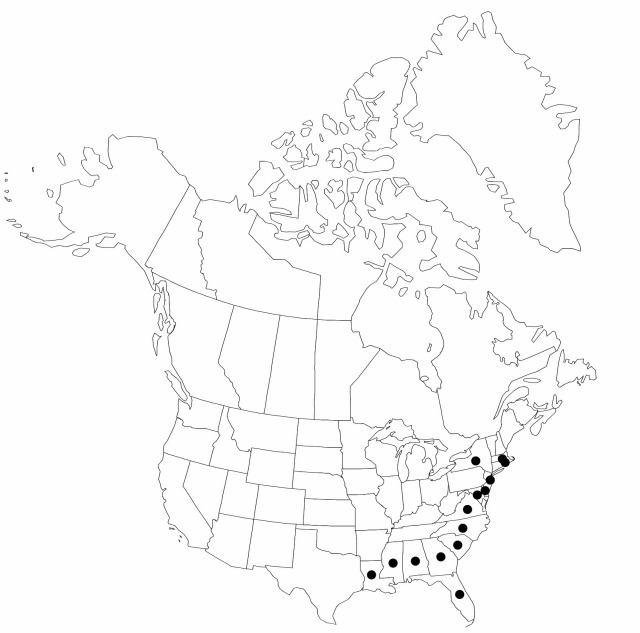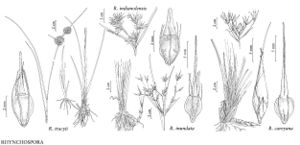Difference between revisions of "Rhynchospora inundata"
Rhodora 20: 139. 1918.
FNA>Volume Importer |
imported>Volume Importer |
||
| (5 intermediate revisions by 2 users not shown) | |||
| Line 7: | Line 7: | ||
|year=1918 | |year=1918 | ||
}} | }} | ||
| − | |basionyms={{Treatment/ID/ | + | |special_status={{Treatment/ID/Special_status |
| + | |code=F | ||
| + | |label=Illustrated | ||
| + | }}{{Treatment/ID/Special_status | ||
| + | |code=E | ||
| + | |label=Endemic | ||
| + | }} | ||
| + | |basionyms={{Treatment/ID/Basionym | ||
|name=Ceratoschoenus macrostachyus var. inundatus | |name=Ceratoschoenus macrostachyus var. inundatus | ||
|authority=Oakes | |authority=Oakes | ||
| + | |rank=variety | ||
| + | |publication_title=Mag. Hort. Bot. | ||
| + | |publication_place=7: 185. 1841 | ||
}} | }} | ||
|synonyms={{Treatment/ID/Synonym | |synonyms={{Treatment/ID/Synonym | ||
|name=Rhynchospora macrostachya var. inundata | |name=Rhynchospora macrostachya var. inundata | ||
|authority=(Oakes) Fernald | |authority=(Oakes) Fernald | ||
| + | |rank=variety | ||
}} | }} | ||
|hierarchy=Cyperaceae;Rhynchospora;Rhynchospora inundata | |hierarchy=Cyperaceae;Rhynchospora;Rhynchospora inundata | ||
| Line 38: | Line 49: | ||
-->{{#Taxon: | -->{{#Taxon: | ||
name=Rhynchospora inundata | name=Rhynchospora inundata | ||
| − | |||
|authority=(Oakes) Fernald | |authority=(Oakes) Fernald | ||
|rank=species | |rank=species | ||
| Line 52: | Line 62: | ||
|publication title=Rhodora | |publication title=Rhodora | ||
|publication year=1918 | |publication year=1918 | ||
| − | |special status= | + | |special status=Illustrated;Endemic |
| − | |source xml=https:// | + | |source xml=https://bitbucket.org/aafc-mbb/fna-data-curation/src/2e0870ddd59836b60bcf96646a41e87ea5a5943a/coarse_grained_fna_xml/V23/V23_357.xml |
|genus=Rhynchospora | |genus=Rhynchospora | ||
|species=Rhynchospora inundata | |species=Rhynchospora inundata | ||
Latest revision as of 20:40, 5 November 2020
Plants perennial, clonal, 50–100 cm; rhizomes slender, scaly, to 2 mm thick. Culms stiffly erect, leafy, triangular, multiribbed. Leaves erect, distal ones overtopping inflorescence; principal blades flat proximally, trigonous distally, 3–10 mm wide, apex attenuate. Inflorescences terminal and axillary, clusters of corymbs (1–)2–3, open, spikelet clusters loose; bracteal leaves mostly overtopping corymbs. Spikelets pale redbrown, narrowly lanceoloid, (9–)11–14 mm, apex acuminate; fertile scales lanceolate, 9–13 mm, apex acuminate, midrib shortexcurrent or not. Flowers: perianth bristles 5–6, extending at least 5 mm beyond tubercle base, antrorsely barbellate. Fruits 1–2 per spikelet, 15–20 mm; body stipitate, obovoid to oblong, compressed, 4–5 × 2–3 mm, margins thick; surfaces concave, horizontally finely striate, minutely cancellate; tubercle stoutbased, grooved, subulate, 10–15 mm, setulose.
Phenology: Fruiting summer–fall.
Habitat: Emergent in shallows of savanna ponds, interdunal pools
Elevation: 0–100 m
Distribution

Ala., Del., Fla., Ga., La., Md., Mass., Miss., N.J., N.Y., N.C., R.I., S.C., Va.
Discussion
Rhynchospora inundata is largely confined to lower Coastal Plain terraces, mostly along the present coast. Typical plants have narrow fruit bodies and narrow inflorescences of sparse clusters, well overtopped by leaves and erect leafy bracts. By contrast, plants of R. careyana have broader fruits, shorter perianths, and larger, broader inflorescences that overtop most or all leaves and bracts. In general, plants of R. careyana are more robust and grow in more acid sites than those of R. inundata. Southward in the Atlantic Coastal and Gulf Coastal plains are broad areas of ecotone where the two species intergrade.
Selected References
None.
